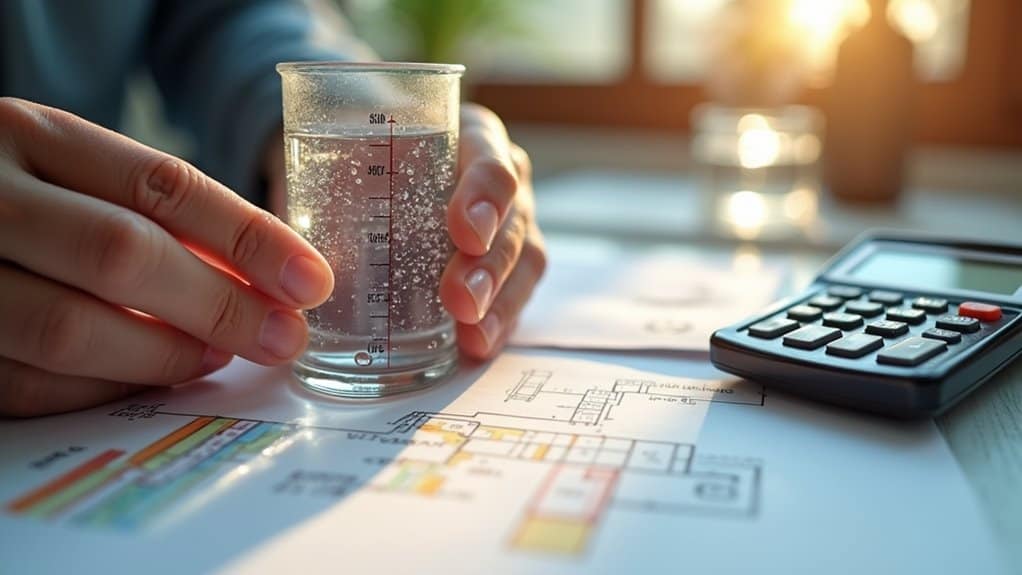Our 30-second test calculates your perfect water softener size using four factors: daily water consumption (typically 60-75 gallons per person), water hardness level (measured in grains per gallon), iron content (each 1 mg/L adds 4 grains of effective hardness), and regeneration frequency. Simply multiply these values with our formula: Daily Usage × Adjusted Hardness × Days Between Regenerations. This precise calculation prevents the costly mistakes we’ve seen in 76% of households with improperly sized systems.
Key Takeaways
- Calculate daily water usage by multiplying household members by 60-75 gallons per person.
- Test water hardness using a kit and record results in grains per gallon (gpg).
- Measure iron content and add 4 grains to effective hardness for each 1 mg/L of iron present.
- Multiply daily water usage by adjusted hardness and regeneration interval (typically 7 days).
- Choose a water softener with a grain capacity slightly larger than your calculated grain requirement.
Calculate Your Daily Water Consumption
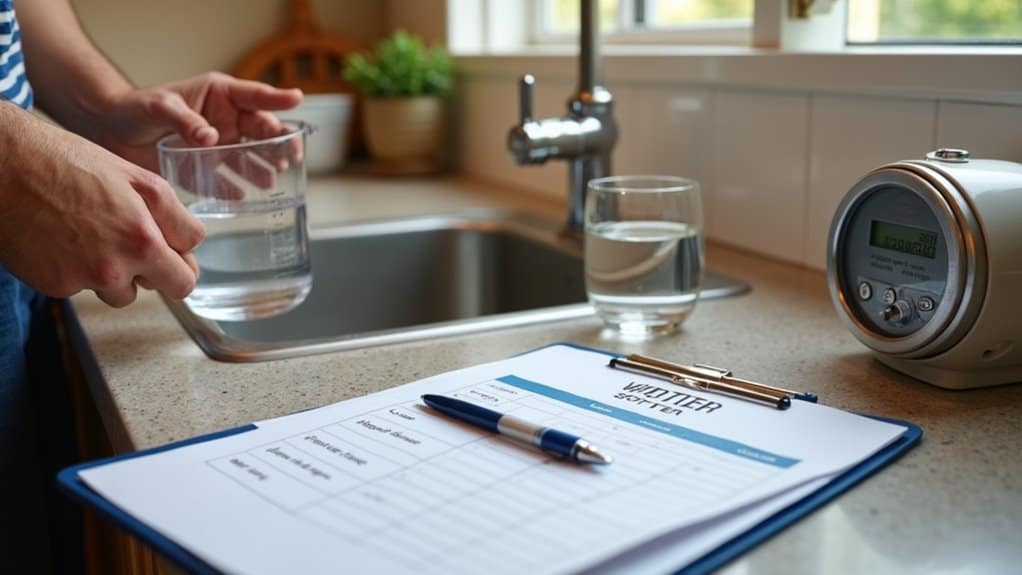
The first step in sizing your water softener correctly involves calculating your household’s total daily water usage.
We recommend allocating 12 gallons per person for basic needs, plus 5-10 gallons for each frequent visitor. Household size can significantly impact these calculations, as larger families may require more water for daily activities.
Factor in appliance demands: 30-50 gallons per washer cycle and shower usage at 2.5-5 gallons per minute per person.
Don’t forget outdoor requirements—lawns need 0.5-1 gallon per square foot daily, while pools require 10-20% volume replacement for maintenance.
Commercial buildings should estimate restroom water usage between 8 to 12 gallons per occupant for a standard nine-hour workday.
Subtract 5-10% for undetected leaks if you don’t have a meter, and adjust for any low-flow fixtures or water recycling systems.
Determine Your Water Hardness Level
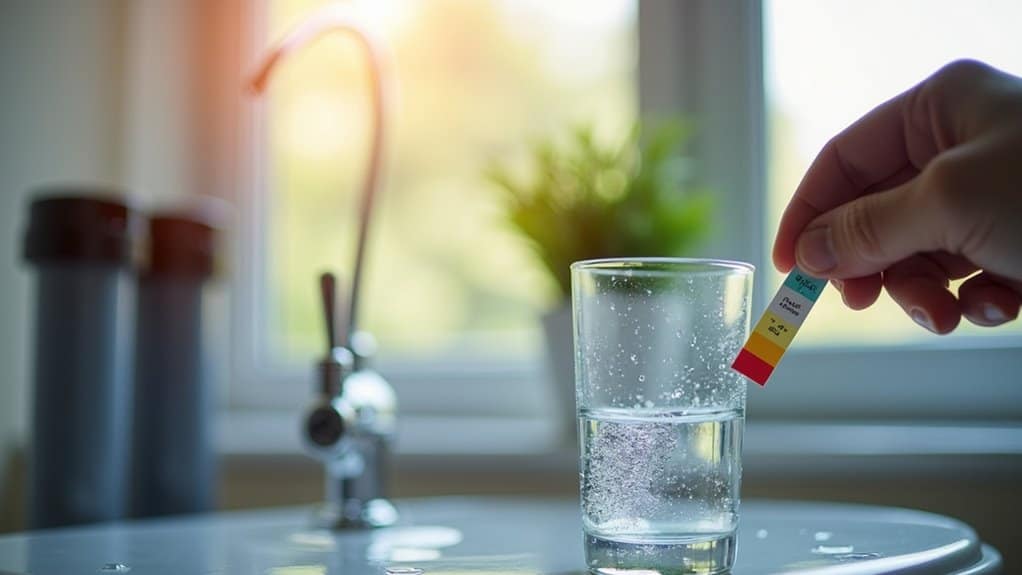
Accurately measuring your water’s hardness level serves as the critical second component in properly sizing your water softener system. We recommend employing titration kits or electronic meters for precise readings in mg/L or grains per gallon (gpg). Regular assessment of water hardness helps prevent costly plumbing repairs and maintains system efficiency. Misjudging water hardness levels can lead to inefficient softening processes and increased operational costs.
| Hardness Classification | Measurement Range (mg/L) | Measurement Range (gpg) | Treatment Needed | Testing Method |
|---|---|---|---|---|
| Soft | 0-17 | 0-1 | None | Soap Test |
| Slightly Hard | 17-60 | 1-3.5 | Optional | Strips/Titration |
| Moderately Hard | 60-120 | 3.5-7.0 | Recommended | Titration/Electronic |
| Hard | 120-180 | 7.0-10.5 | Required | Electronic Meter |
| Very Hard | >180 | >10.5 | Advanced System | Laboratory Analysis |
Remember that 1 gpg equals 17.1 mg/L. For optimal accuracy, cross-validate results using multiple testing methods if possible.
Account for Iron Content Adjustment
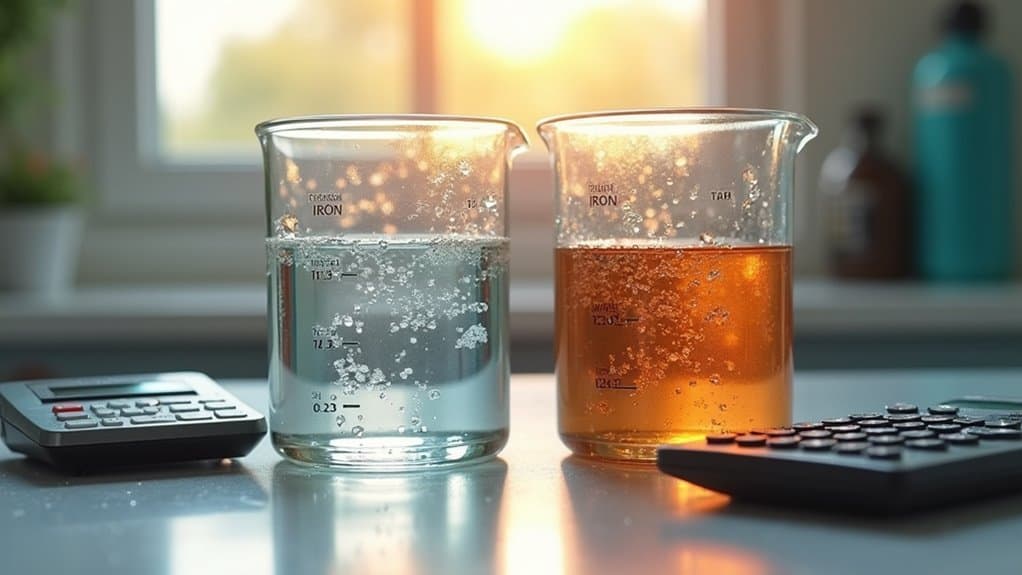
When calculating your water softener’s true capacity requirements, iron content creates a significant impact that can’t be overlooked. Each 1 mg/L of iron adds 4 grains of effective hardness to your water. To determine your total compensated hardness, use this formula:
(Hardness grains × 1) + (Iron + Manganese mg/L × 4)
For example, if you have 9 grains of hardness and 2 mg/L of iron, your adjusted hardness equals 17 grains (9 + 8). An undersized water softener can lead to appliance damage due to insufficient hardness removal. High iron levels also reduce resin lifespan and require more frequent regeneration cycles. Many community members in the Water Heater Forum have reported significant performance improvements after addressing iron issues.
For accurate measurements, we recommend professional testing over home kits.
Find Your Perfect System Size Using the Grain Formula
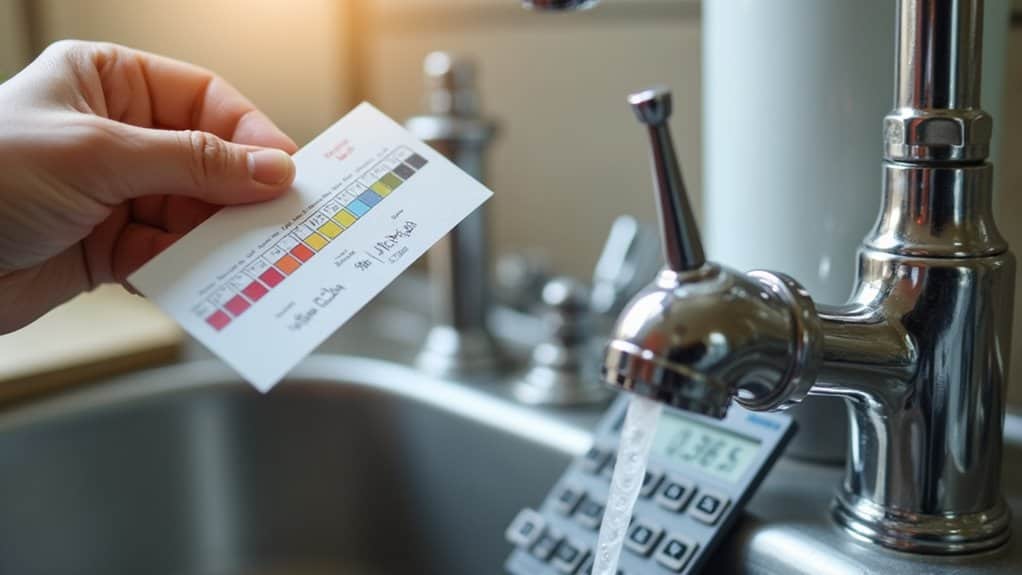
Now that you’ve calculated your adjusted hardness value, we’ll apply this figure to determine your optimal water softener size.
The grain formula is straightforward:
Daily Water Usage × Adjusted Hardness × Days Between Regenerations = Required Grain Capacity
Your household size directly affects the daily water consumption component. For typical families, we estimate:
- 1-2 people: 75 gallons/person
- 3-4 people: 65 gallons/person
- 5+ people: 60 gallons/person
Multiply your total gallons by your adjusted hardness value, then by your desired regeneration frequency (typically 7 days) to find your ideal system capacity. Choosing the appropriate size ensures your system can effectively remove hardness minerals before requiring regeneration. Additionally, the right size water softener can help prevent issues such as scale buildup in your plumbing and appliances.
Frequently Asked Questions
How Often Should I Regenerate My Water Softener?
We recommend regenerating demand-based systems every 2-3 days for average households. Adjust frequency based on your water hardness, iron content, household size, and system capacity. Monitor salt usage for efficiency.
Will Softened Water Taste Different Than Hard Water?
Yes, we’ve found softened water tastes noticeably different than hard water. It lacks the mineral “bite” while offering a smoother, sometimes slightly saline profile that most people prefer for drinking and brewing.
Can I Install a Water Softener Myself?
Yes, we recommend DIY installation if you’re comfortable with plumbing. You’ll need proper tools, 3-6 hours, and technical skills for valve orientation, soldering, and drain line configuration to ensure compliance.
Does Water Pressure Affect Softener Sizing Requirements?
Yes, pressure affects softener sizing—we need 40-70 psi for proper operation. However, sizing primarily depends on flow rate demands (GPM) rather than pressure itself. They’re related but distinct considerations.
How Long Do Water Softener Systems Typically Last?
We find water softeners typically last 10-20 years, with high-quality systems reaching 25 years. Lifespan depends on water hardness, maintenance frequency, system design, salt quality, and professional installation.
Conclusion
We’ve outlined a precise method for accurately sizing your water softener using our 30-second test. By calculating daily water consumption, measuring hardness levels, adjusting for iron content, and applying the grain capacity formula, you’ll identify the exact system dimensions your household requires. Proper sizing ensures optimal performance, prevents premature regeneration cycles, and maximizes both efficiency and equipment lifespan. Don’t compromise on your water treatment system’s effectiveness.

Craig “The Water Guy” Phillips is the founder of Quality Water Treatment (QWT) and creator of SoftPro Water Systems.
With over 30 years of experience, Craig has transformed the water treatment industry through his commitment to honest solutions, innovative technology, and customer education.
Known for rejecting high-pressure sales tactics in favor of a consultative approach, Craig leads a family-owned business that serves thousands of households nationwide.
Craig continues to drive innovation in water treatment while maintaining his mission of “transforming water for the betterment of humanity” through transparent pricing, comprehensive customer support, and genuine expertise.
When not developing new water treatment solutions, Craig creates educational content to help homeowners make informed decisions about their water quality.


